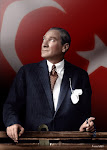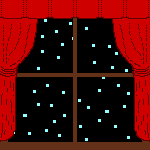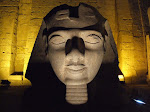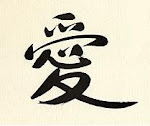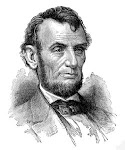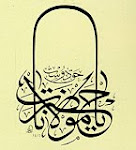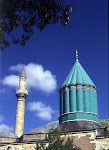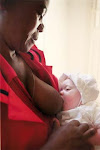
Freedom is my character!
The peace at home, peace at the World!
Özgürlük benim karakterimdir!
Yurtta barış, dünyada barış!
El Libertador
Mustafa Kemal ATATÜRK

 El Libertador
El Libertador
Simon Bolivar
Simón José Antonio de la Santísima Trinidad Bolívar was born in Caracas on July 24, 1783, to don Juan Vicente Bolívary Ponte and doña Maria de la Concepción Palacios y Blanco. An aristocrat by birth, Simón Bolívar received an excellent education from his tutors, especially Simón Rodríguez. Thanks to his tutors, Bolívar became familiar with the works of the Enlightenment as well as those of classical Greece and Rome.
By the age of nine, however, Bolívar lost both his parents and was left in the care of his uncle, don Carlos Palacios. At the age of fifteen, don Carlos Palacios sent him to Spain to continue his education.
Bolívar left for Spain in 1799 with his friend, Esteban Escobar. En route, he stopped in Mexico City where he met with the viceroy of New Spain who was was alarmed with the young Bolívar argued with confidence on behalf of Spanish American independence. Bolívar arrived in Madrid on June of that same year and stayed with his uncle, Esteban Palacios.
In Spain, Bolívar met Maria Teresa Rodríguez del Toroy Alaysa whom he married soon afterwards in 1802. Shortly after returning to Venezuela, in 1803, Maria Teresa died of yellow fever. Her death greatly affected Bolívar and he vowed never to marry again. A vow which he kept for the rest of his life.
After losing his wife, Bolívar returned to Spain with his tutor and friend, Simón Rodríguez, in 1804. While in Europe he witnessed the proclamation of Napoleon Bonaparte as Emperor of France and later the coronation of Napoleon as King of Italy in Milan. Bolívar lost respect for Napoleon whom he considered to have betrayed the republican ideals. But it was in while in Italy that Bolívar made his famous vow atop Mount Aventin of Rome to never rest until America was free.
Bolívar returned to Venezuela in 1807 after a brief visit to the United States. In 1808 Napoleon installed his brother, Joseph, as King of Spain. This launched a great popular revolt in Spain known as the Peninsular War. In America, as in Spain, regional juntas were formed to resist the new king. Unlike the Spanish junts, however, the American juntas fought against the power of the Spanish king, not only the person of Joseph Bonaparte.
That year, the Caracas junta declared its independence from Spain and Bolívar was sent to England along with Andrés Bello and Luis López Mendez on a diplomatic mission. Bolívar returned to Venezuela on June 3, 1811, and delivered his discourse in favor of independence to the Patriotic Society. On August 13 patriot forces under the command of Francisco de Miranda won a victory in Valencia.
On July 24, 1812, Miranda surrendered after several military setbacks and Bolívar soon had to flee to Cartagena. From there, Bolívar wrote his famous Cartagena Manifesto in which he argued that New Granda should help liberate Venezuela because their cause was the same and Venezuela's freedom would secure that of New Granada. Bolívar received assistance from New Granada and in 1813 he invaded Venezuela. He entered Merida on May 23 and was proclaimed "Libertador" by the people. On June 8 Bolívar proclaimed the "war to the death" in favor of liberty. Bolívar captured Caracas on August 6 and two days later proclaimed the second Venezuelan republic.
After several battles, Bolívar had to flee once more and in 1815 he took refuge in Jamaica from where he wrote his Jamaica Letter. That same year, Bolívar traveled to Haiti and petitioned its president, Alexander Sabes Petión, to help the Spanish American cause. In 1817, with Haitian help, Bolívar returned to the continent to continue fighting.
The Battle of Boyaca of August 7, 1819 resulted in a great victory for Bolívar and the army of the revolution. That year, Bolívar created the Angostura Congress which founded Gran Colombia (a federation of present-day Venezueal, Colombia, Panama, and Ecuador) which named Bolívar president. Royalist opposition was eliminated during the following years. After the victory of Antonio José de Sucre over the Spanish forces at the Battle of Pichincha on May 23, 1822, all of northern South America was liberated. With that great victory, Bolívar prepared to march with his army across the Andes and liberate Peru.
On July 26, 1822, Bolívar met with José de San Martín at Guayaquil to discuss the strategy for the liberation of Peru. No one knows what took place in the secret meeting between the two South American heroes, but San Martín returned to Argentina while Bolívar prepared to fight against last Spanish bastion in South America.
In 1823 Bolívar took command of the invasion of Peru and in September arrived in Lima with Sucre to plan the attack. On August 6, 1824, Bolívar and Sucre jointly defeated the Spanish army in the Battle of Junín. On December 9 Sucre destroyed the last remnant of the Spanish army in the Battle of Ayacucho, eliminating Spain's presence in South America.
On August 6, 1825, Sucre called the Congress of Upper Peru which created the Republic of Bolivia in honor of Bolívar. The Bolivian Constitution of 1826, while never enacted, was personally written by Bolívar. Also in 1826, Bolívar called the Congress of Panama, the first hemispheric conference.
But by 1827, due to personal rivalries among the generals of the revolution, civil wars exploded which destroyed the South American unity for which Bolívar had fought. Surrounded by factional fighting and suffering from tuberculosis, El Libertador Simón Bolívar died on December 17, 1830.
By the age of nine, however, Bolívar lost both his parents and was left in the care of his uncle, don Carlos Palacios. At the age of fifteen, don Carlos Palacios sent him to Spain to continue his education.
Bolívar left for Spain in 1799 with his friend, Esteban Escobar. En route, he stopped in Mexico City where he met with the viceroy of New Spain who was was alarmed with the young Bolívar argued with confidence on behalf of Spanish American independence. Bolívar arrived in Madrid on June of that same year and stayed with his uncle, Esteban Palacios.

In Spain, Bolívar met Maria Teresa Rodríguez del Toroy Alaysa whom he married soon afterwards in 1802. Shortly after returning to Venezuela, in 1803, Maria Teresa died of yellow fever. Her death greatly affected Bolívar and he vowed never to marry again. A vow which he kept for the rest of his life.
After losing his wife, Bolívar returned to Spain with his tutor and friend, Simón Rodríguez, in 1804. While in Europe he witnessed the proclamation of Napoleon Bonaparte as Emperor of France and later the coronation of Napoleon as King of Italy in Milan. Bolívar lost respect for Napoleon whom he considered to have betrayed the republican ideals. But it was in while in Italy that Bolívar made his famous vow atop Mount Aventin of Rome to never rest until America was free.
Bolívar returned to Venezuela in 1807 after a brief visit to the United States. In 1808 Napoleon installed his brother, Joseph, as King of Spain. This launched a great popular revolt in Spain known as the Peninsular War. In America, as in Spain, regional juntas were formed to resist the new king. Unlike the Spanish junts, however, the American juntas fought against the power of the Spanish king, not only the person of Joseph Bonaparte.
That year, the Caracas junta declared its independence from Spain and Bolívar was sent to England along with Andrés Bello and Luis López Mendez on a diplomatic mission. Bolívar returned to Venezuela on June 3, 1811, and delivered his discourse in favor of independence to the Patriotic Society. On August 13 patriot forces under the command of Francisco de Miranda won a victory in Valencia.
On July 24, 1812, Miranda surrendered after several military setbacks and Bolívar soon had to flee to Cartagena. From there, Bolívar wrote his famous Cartagena Manifesto in which he argued that New Granda should help liberate Venezuela because their cause was the same and Venezuela's freedom would secure that of New Granada. Bolívar received assistance from New Granada and in 1813 he invaded Venezuela. He entered Merida on May 23 and was proclaimed "Libertador" by the people. On June 8 Bolívar proclaimed the "war to the death" in favor of liberty. Bolívar captured Caracas on August 6 and two days later proclaimed the second Venezuelan republic.
After several battles, Bolívar had to flee once more and in 1815 he took refuge in Jamaica from where he wrote his Jamaica Letter. That same year, Bolívar traveled to Haiti and petitioned its president, Alexander Sabes Petión, to help the Spanish American cause. In 1817, with Haitian help, Bolívar returned to the continent to continue fighting.
The Battle of Boyaca of August 7, 1819 resulted in a great victory for Bolívar and the army of the revolution. That year, Bolívar created the Angostura Congress which founded Gran Colombia (a federation of present-day Venezueal, Colombia, Panama, and Ecuador) which named Bolívar president. Royalist opposition was eliminated during the following years. After the victory of Antonio José de Sucre over the Spanish forces at the Battle of Pichincha on May 23, 1822, all of northern South America was liberated. With that great victory, Bolívar prepared to march with his army across the Andes and liberate Peru.
On July 26, 1822, Bolívar met with José de San Martín at Guayaquil to discuss the strategy for the liberation of Peru. No one knows what took place in the secret meeting between the two South American heroes, but San Martín returned to Argentina while Bolívar prepared to fight against last Spanish bastion in South America.
In 1823 Bolívar took command of the invasion of Peru and in September arrived in Lima with Sucre to plan the attack. On August 6, 1824, Bolívar and Sucre jointly defeated the Spanish army in the Battle of Junín. On December 9 Sucre destroyed the last remnant of the Spanish army in the Battle of Ayacucho, eliminating Spain's presence in South America.
On August 6, 1825, Sucre called the Congress of Upper Peru which created the Republic of Bolivia in honor of Bolívar. The Bolivian Constitution of 1826, while never enacted, was personally written by Bolívar. Also in 1826, Bolívar called the Congress of Panama, the first hemispheric conference.
But by 1827, due to personal rivalries among the generals of the revolution, civil wars exploded which destroyed the South American unity for which Bolívar had fought. Surrounded by factional fighting and suffering from tuberculosis, El Libertador Simón Bolívar died on December 17, 1830.
 Simon Bolivar
Simon Bolivar
Derleyen: Ayhan Görür

